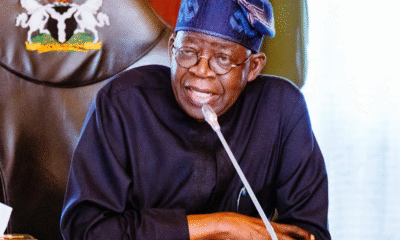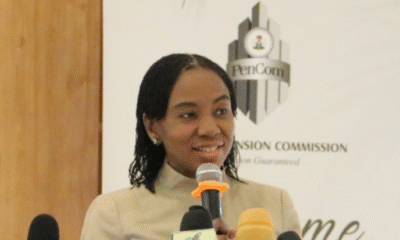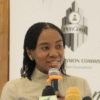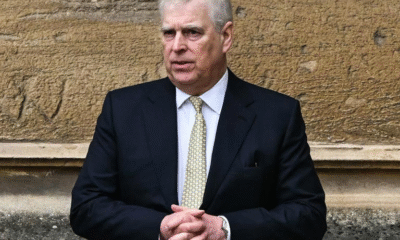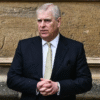News
AU Disagrees With PFN, CAN Over Alleged Christian Genocide In Nigeria

Divergent reactions have continued to trail the allegation of alleged genocide against Christians in Nigeria, with the African Union (AU) Commission maintaining that nothing of such scale was happening in Africa’s most populous nation.
AU Commission Chairperson, Mahmoud Ali Youssouf, rejected the accusations by U.S. President Donald Trump that “very large numbers” of Christians were being killed in Africa’s most populous country.
“What’s going on in the northern part of Nigeria has nothing to do with the kind of atrocities we see in Sudan or in some part of eastern DRC,” Youssouf told reporters at the United Nations in New York, referring to Democratic Republic of Congo.
“Think twice before… making such statements,” he said. “The first victims of Boko Haram are Muslims, not Christians,” Reuters quoted the AU chief as saying.
The extremist Islamist armed group Boko Haram has also terrorised northeast Nigeria, an insurgency that has killed tens of thousands of people over the past 15 years. Human rights experts have said most Boko Haram victims have been Muslims.
Trump earlier this month said he has asked the Defence Department to prepare for possible “fast” military action if Nigeria fails to crack down on the killing of Christians. He did not provide any specific evidence for his accusation.
He also threatened to “stop all aid and assistance to Nigeria, and may very well go into that now disgraced country, ‘guns-a-blazing,’ to completely wipe out the Islamic Terrorists who are committing these horrible atrocities.”
Nigeria’s Foreign Ministry has said the country would keep fighting violent extremism and that it hoped Washington would remain a close ally, saying it “will continue to defend all citizens, irrespective of race, creed, or religion.”
Nigeria, which has 200 ethnic groups practicing Christianity, Islam and traditional religions, has a long history of peaceful coexistence. But it has also seen flare-ups of violence among groups, often exacerbated by ethnic divisions or conflict over scarce resources.
But separately, the Pentecostal Fellowship of Nigeria (PFN) and the Plateau State chapter of the Christian Association of Nigeria (CAN) have disagreed with the notion that there’s no mass killing of Christians in the country, urging the federal government to end what it described as an ongoing “Christian genocide” in the country and warning that continued silence in the face of mass killings could threaten Nigeria’s unity.
Speaking after an emergency executive meeting of the Fellowship held at its national headquarters in Lagos, PFN President, Bishop Wale Oke, said the Christian body would no longer remain silent while Christians are “targeted, killed, raped, and displaced” across several states.
“There is Christian genocide going on in Nigeria,” Oke declared. “If we call it by any other name, it will bring Nigeria down. We are crying out to our international friends, beginning with America and Donald Trump. Whatever you can do to help our government put an end to it, come quickly and get it done,” he added.
The cleric cited recent mass killings in Benue and Plateau States, where, according to him, hundreds of Christians were massacred on Christmas Day and in Dogon Noma. He described the incidents as clear evidence of systematic targeting.
“When 501 Christians were massacred in Dogon Noma in Plateau, what do we call that? When Christmas Day turned into a bloody day in Benue with hundreds killed, what name should we give it?” he asked.
Oke also referenced the cases of Leah Sharibu, still held captive by Boko Haram since 2018; and Deborah Samuel, who was lynched in Sokoto in 2022, as examples of persecution against Christians.
The PFN President said he and other Christian leaders had in the past raised the matter with former President Muhammadu Buhari but were disappointed that the administration failed to address their concerns.
“We spoke strongly about this and the President listened to us, but he ignored the main issue we came for,” Oke said. “That day, I knew his government was complicit in what was going on,” he added.
Backing Trump’s recent comments on Christian persecution in Nigeria, Oke said Trump “only echoed what Nigerian Christians have been saying for years.” He alleged that the killings were being carried out by armed groups including Fulani herdsmen, Boko Haram, and ISWAP, using religion as a cover.
“The evidence is all over the place. It is evil, it is bloodshed, it is mass murder, and it is genocide. The time to stop it is now,” he said. “Christians in this nation must be free to practice their faith in any part of Nigeria as bona fide citizens.”
Oke called on President Bola Tinubu to urgently overhaul the nation’s security architecture, bring perpetrators of religious violence to justice, and ensure that those with extremist sympathies are removed from sensitive positions.
“The government should prove by action, not words, that it is not complicit,” he said. “When hundreds are buried in mass graves and the whole world sees it, who can deny it? Why should we play politics with the blood of Nigerians?,” he queried.
He also criticised the government’s policy of rehabilitating “repentant terrorists,” calling it a grave security risk.
The PFN meeting, attended by its national and regional leaders, reaffirmed the Fellowship’s commitment to national unity, peace, and the protection of fundamental human rights. The body urged the media to “side with the oppressed” and to report the truth “without fear or bias.”
“We are not going to keep quiet. We will keep raising our voices until justice is done and every Nigerian, regardless of faith, can live in peace. The truth may be suppressed for a time, but it cannot be buried forever,” he argued.
Also, the Plateau State chapter of CAN has declared that “Christian genocide” is ongoing in Nigeria citing the continuous killings, persecution, and displacement of Christians in several parts of the country.
This declaration was contained in a communiqué issued at the end of the State Executive Council (SEC) meeting of CAN, held on Thursday, November 13, 2025, at The Covenant Word Christian Centre International, Jos.
The communiqué which was read by the State Chairman, Dr. Dunka Gomwalk, declared that the persistent attacks on Christian communities, destruction of farmlands, and the failure of security agencies to arrest and prosecute perpetrators have raised serious concerns about the government’s willingness to protect the lives and property of its citizens.
The association called on both the federal and state governments to take decisive action to end the ongoing violence and bring justice to the affected communities. CAN also urged the international community and human rights organisations to take note of the situation and intervene to prevent further bloodshed.
Gomwalk emphasised that the Church would continue to pray for peace but insisted that “silence in the face of evil is complicity,” urging Christians to remain vigilant while seeking peaceful solutions.
In the same vein, the Senior Pastor of Daystar Christian Centre, Sam Adeyemi, has warned that any potential intervention by the US over alleged killings of Christians in Nigeria could have “messy” consequences, urging the Nigerian government to urgently address the crisis and uphold the sanctity of human life.
Speaking at a press briefing in Lagos to mark the 30th anniversary of Daystar Christian Centre, Adeyemi condemned what he described as “large-scale killings of Christians” across the country, saying the evidence is “too visible to deny.”
“Christians have been killed in our country in large numbers. That cannot be contested because the evidence is everywhere; on the internet, in pictures, in numbers,” he said. “Whether we call it genocide or not does not reduce the pain of families who have lost loved ones, often in gruesome ways.”
The cleric cautioned Nigerians against arguing over semantics and called for sober reflection on the value of human life.
“We’ve left the main issue,” Adeyemi said. “What is the value of life in our country? Why should people be killed like that? People are being killed every day for reasons for which they should not die.”
He linked the U.S. government’s growing interest in the situation to reports by Nigerians abroad who had reached out to Washington about faith-based killings, noting that America’s stance was rooted in its founding values.
“America got involved because Nigerians who experienced the pain reached out to members of the U.S. government,” he said. “Their Declaration of Independence says all men are created equal and have the right to life, liberty, and the pursuit of happiness. Those are their values. We should ask ourselves: do we value human life in our country?”
Adeyemi recounted how insecurity had personally affected his family, revealing that his mother had been unable to visit their hometown in Kogi State due to the threat of kidnappers.
“My mother hasn’t been able to go back home since we buried my father last year,” he said. “Many Nigerians can’t travel to their hometowns anymore because of fear.”
While acknowledging that some perpetrators of violence claim religious motives, he stressed that the majority of Muslims are peace-loving, adding that Nigeria must avoid allowing external forces to dictate solutions to its internal problems.
“If America intervenes, it will be messy,” Adeyemi warned. “Some of those who support the killings are powerful; some are in government, some are wealthy. After America leaves, we will still have to sit down and talk. That conversation is long overdue.”
He urged Nigerians to look beyond religious and ethnic divisions and confront the real issues of leadership, governance, and justice that have plagued the nation’s stability.
“The big issue is not religion or tribe,” he said. “It’s whether we want this country to become a developed economy. The countries from which Christianity and Islam originated are both developed and developing. Where do we want Nigeria to go?”
Adeyemi challenged the elite class to rethink their role in a system that devalues human life, warning that history would judge leaders who fail to use their influence for the common good.
“Our culture does not believe in the equality of human life. The powerful are too powerful, and the powerless are too powerless,” he said. “Those of us in the elite class must move from success to significance; from wealth to legacy. What will we be remembered for?”
He called on citizens to speak up, demand accountability, and support policies that prioritise development, infrastructure, and equality.
“As long as we keep silent, those who don’t mean well will continue to dominate the government,” Adeyemi cautioned. “We must not sit down and watch this country disintegrate. Leadership is service, and love is recognising the value of every human being.”
He called for a restructuring of Nigeria’s political and moral systems, adding that the greatest expression of faith is love; the recognition that every human being is created in the image of God.
“Whatever you would not give to God, don’t give to another human being,” Adeyemi said. “If you serve people, serve them with excellence. That is the purpose of leadership,” he said.
On the church’s 30th anniversary celebration, Adeyemi said the milestone would feature a week-long lineup of activities designed to inspire leadership, social impact, and community transformation.
“We have lined up several activities for this anniversary, including worship concerts, community outreach, leadership conferences, and impact stories from across our global network,” he said. “Our focus remains on raising role models and transforming society through the teaching and practice of God’s word.”
He announced that the anniversary, which began on November 12, 2025, will run until November 16, 2025, with a series of events reflecting Daystar’s vision of “raising role models who make Christ attractive through excellence.”
His wife and co-pastor, Nike Adeyemi described the 30-year journey as one of grace, growth, and transformation, thanking members and partners of the ministry for their faith and service.
“We are grateful to God for His faithfulness through these 30 years,” she said. “Daystar has been a story of changed lives and empowered people. We look forward to even greater impact in the years ahead,” she noted.
Similarly, a Kogi State former governorship aspirant and women leader, Grace Adejoh, has urged the federal government to tackle indiscriminate killings of Christians in the Country. Adejoh said silence and denial will not stop the current bloodshed in the country but only truth, justice, and moral leadership can do.
This was contained in a press statement made available to the journalists in Lokoja on Thursday.
The women leader pointed out that for decades, Christians in Nigeria have endured sustained persecution and violence and are suffering in silence with no one to come to their aid, wondering why some people are now kicking against the planned intervention of United State of America
“Christians suffering is not new, but it has become more systematic and deadly in recent years. Too often, Nigerian Christians pay the price for global events beyond their borders… Groups such as Boko Haram and the Islamic State West Africa Province (ISWAP) — inspired by global jihadist movements like ISIS and Al-Qaeda — have waged relentless campaigns against Christian communities.
“ According to Amnesty International, Boko Haram has killed more than 37,000 people and displaced over 2.5 million in the Lake Chad region since 2009. Many of these victims have been Christians targeted specifically for their faith.
“The Open Doors World Watch List (2024) ranks Nigeria as the sixth most dangerous country in the world to be a Christian, citing “extreme levels of violence and persecution. Similarly, the U.S. Commission on International Religious Freedom (USCIRF) has repeatedly recommended that Nigeria remains on the list of “Countries of Particular Concern” due to the government’s inability or unwillingness to stop faith-based killings.
“Yet, despite mounting evidence, there is a persistent reluctance — both domestically and internationally — to label the situation as genocide. Such hesitation is often political. Declaring a genocide triggers moral, legal, and diplomatic obligations under international law, including potential interventions or sanctions,” she said.
Meanwhile, the Minister of Information, Mohammed Idri, has tasked the National Advertising practitioners to use their creative story-telling to change the deliberate and damaging narrative that Nigeria is a country that has no religious tolerance.
He made the appeal on Thursday at the 5th edition National Advertising Conference in Abuja, saying that as marketing communication professionals they have enormous responsibility as not only storytellers of brands and businesses but as custodians of national image and national reputation.
He described the perception as a distortion of Nigeria’s reality as a nation of diverse peoples and faiths who have lived together peacefully for generations.
Idris said: “Yes, Nigeria indeed faces security challenges, especially from terrorist and violence extremists, but these are not targeted at any religion or ethnic group particularly. All Nigerians, Christians, Muslims, everyone is affected and has suffered from the menace of terrorism and barbarism in this country. The administration of President Bola Tinubu is fully committed to ending this course. We have invested deeply in strengthening our security architecture, rejigging the command and control structure, and injecting fresh and new ideas and perspectives into the war against terror.
“When false narratives about Nigeria are spread, especially internationally and also intentionally, it is your creativity, your strategy, and your storytelling that can counterbalance them with truth, with context, and compelling narratives of hope and progress. We need a communication renaissance, one that emphasizes facts over fear, unity over division, and truth over propaganda. “We must project Nigeria as it is, a diverse, dynamic, and resilient nation of hard-working people who coexist peacefully, aspire collectively, and strive daily to build a better society”.
He said the federal government is taking the characterisation of the country as a country of particular concern as a challenge, saying the administration is stable, focused, determined and engaging stakeholders both within and outside the country, including the United States.
He commended the Advertising and Briefing Council of Nigeria, under the leadership of Dr. Olalekan Fadolapo, and other industry stakeholders for instituting the conference as an annual event.
Also, the Hope Alive Initiative (HAI), a Nigerian civil society organisation, has expressed deep concern over the recent decision by the United States Government to classify Nigeria as a Country of Particular Concern (CPC).
In a statement by its Director of Media and Communications, Mr Ernest Omoarelojie, the group cautioned that the accompanying threat of potential military intervention undermines Nigeria’s ongoing security and diplomatic efforts to address its complex challenges.
While acknowledging that the actions of extremist groups have led to the tragic loss of innocent lives, HAI emphasised that such incidents reflect a multifaceted crisis affecting all Nigerians, irrespective of religious or ethnic affiliation.
“We acknowledge, with profound sorrow, the brutal killings perpetrated by extremist groups and the senseless loss of innocent lives. However, we must stress that the victims cut across all religious and ethnic lines. This is not a one-dimensional religious conflict but a complex, multi-layered security crisis affecting Christians, Muslims, and adherents of all faiths alike,” the statement read.
HAI therefore urged President Trump and the United States Government to adopt a cooperative rather than confrontational approach—one consistent with America’s long-standing global commitment to the defence of human rights.
The group argued that meaningful progress in promoting regional stability and strengthening counter-terrorism efforts can only be achieved through partnership and mutual respect.
“We urge President Trump and the US Government to pursue collaboration rather than confrontation—working jointly with Nigeria to enhance regional stability, reinforce counter-terrorism efforts, and ensure the safety and security of all Nigerians,” the organisation stated.
The group further highlighted Nigeria’s strategic importance as Africa’s most populous nation and a pivotal contributor to peace and stability across the continent. It noted that Nigeria has consistently borne significant responsibilities, including leading efforts in African decolonisation and participating in numerous international peacekeeping missions.
HAI appealed to the international community for greater understanding and cooperation as Nigeria strives to overcome its security challenges.
The organisation pointed to tangible progress already made—such as improved intelligence sharing, stronger inter-agency coordination, community-based security initiatives focused on early warning and resilience, and the implementation of the National Counter-Terrorism Strategy.
It also cited the expansion of interfaith dialogue platforms as evidence of Nigeria’s commitment to addressing the root causes of extremism.


